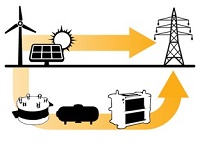Alkaline Water Electrolyzer for Improved Power-To-Gas System

Technology Description:
The team led by Dioxide Materials will develop an alkaline water electrolyzer for an improved power-to-gas system. The team’s electrochemical cells are composed of an anode, a cathode, and a membrane that allows anions to pass through, while being electrically insulating. High-conductivity anion exchange membranes are rare and often do not have the chemical or mechanical stability to withstand H2 production at elevated pressures. Therefore, the project is focused on developing an anion exchange membrane that is low-cost, is manufacturable in a scaleable process, and has sufficient conductivity, chemical stability, and mechanical strength. Moreover, by operating at alkaline instead of acidic conditions, the electrochemical cells do not need to use expensive precious metal catalysts, which most systems require to prevent corrosion. Dioxide Materials estimates that operating under alkaline conditions could lead to a 10x lower electrolyzer stack cost due to higher current densities and lower material costs (i.e. non-precious metals). The system will be compatible with intermittent energy sources because it can operate at lower temperatures than competiting technologies, thus allowing startup times on the order of seconds.
Potential Impact:
If successful, this technology could yield greatly improved water electrolyzers, which could enable low-cost energy storage compatible with intermittent renewable energy sources, such as solar and wind power.
Security:
Storing energy from intermittent renewables over long durations in a cost-effective manner could reduce demand on the electric grid, while produced H2 or derived liquids could provide a low-carbon alternative to fossil fuels for transportation.
Environment:
Clean energy storage technologies could allow high penetration of emissions-free renewable power.
Economy:
The team’s innovations could reduce the cost of long-term energy storage and therefore enable renewables to be more cost competitive with conventional generation sources.
Contact
ARPA-E Program Director:
Dr. Grigorii Soloveichik
Project Contact:
Prof. Rich Masel
Press and General Inquiries Email:
ARPA-E-Comms@hq.doe.gov
Project Contact Email:
rich.masel@dioxidematerials.com
Related Projects
Release Date:
01/07/2015
